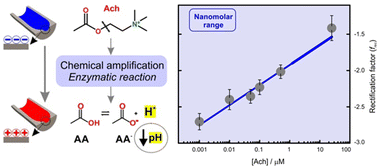Highly sensitive acetylcholine biosensing via chemical amplification of enzymatic processes in nanochannels†
Abstract
Acetylcholinesterase-modified nanochannels are proposed as reliable and reproducible nanofluidic sensors for highly sensitive detection of acetylcholine. The operation mechanism relies on the use of weak polyelectrolytes as “chemical amplifiers” that adjust/reconfigure the nanochannel surface charge in the presence of local pH changes induced by the enzymatic reaction. Experimental results show that the presence of acetylcholine can be transduced into measurable ionic signals with a low limit of detection.

- This article is part of the themed collection: Celebrating 10 years of ChemComm Emerging Investigators


 Please wait while we load your content...
Please wait while we load your content...